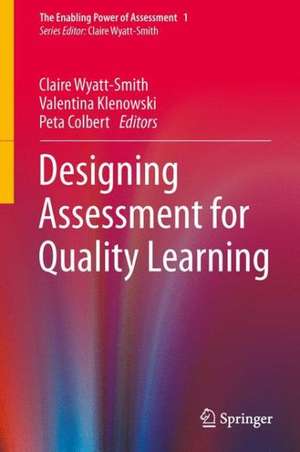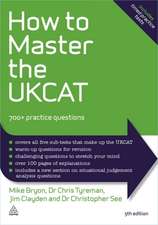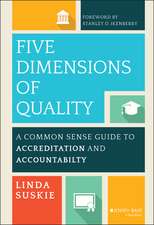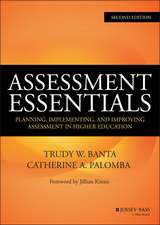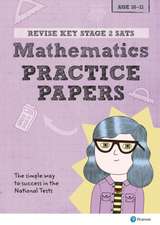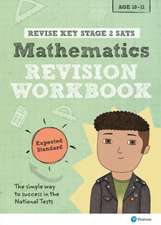Designing Assessment for Quality Learning: The Enabling Power of Assessment, cartea 1
Editat de Claire Wyatt-Smith, Valentina Klenowski, Peta Colberten Limba Engleză Hardback – 26 mar 2014
The volume contributes to the theorising of assessment in contexts characterised by heightened accountability requirements and constant change. The book’s structure and content reflect already significant and growing international interest in assessment as contextualised practice, as well as theories of learning and teaching that underpinand drive particular assessment approaches. Learning theories and practices, assessment literacies, teachers’ responsibilities in assessment, the role of leadership, and assessment futures are the organisers within the book’s structure and content.
The contributors to this book have in common the view that quality assessment, and quality learning and teaching are integrally related. Another shared view is that the alignment of assessment with curriculum, teaching and learning is linchpin to efforts to improve both learning opportunities and outcomes for all. Essentially, the book presents new perspectives on the enabling power of assessment. In so doing, the writers recognise that validity and reliability - the traditional canons of assessment – remain foundational and therefore necessary. However, they are not of themselves sufficient for quality education. The book argues that assessment needs to be radically reconsidered in the context of unprecedented societal change. Increasingly, communities are segregating more by wealth, with clear signs of social, political, economic and environmental instability. These changes raise important issues relating to ethics and equity, taken to be core dimensions in enabling the power of assessment to contribute to quality learning for all. This book offers readers new knowledge about how assessment can be used to re/engage learners across all phases of education.
| Toate formatele și edițiile | Preț | Express |
|---|---|---|
| Paperback (1) | 794.98 lei 38-44 zile | |
| SPRINGER NETHERLANDS – 3 sep 2016 | 794.98 lei 38-44 zile | |
| Hardback (1) | 805.40 lei 38-44 zile | |
| SPRINGER NETHERLANDS – 26 mar 2014 | 805.40 lei 38-44 zile |
Preț: 805.40 lei
Preț vechi: 1059.73 lei
-24% Nou
Puncte Express: 1208
Preț estimativ în valută:
154.13€ • 160.32$ • 127.25£
154.13€ • 160.32$ • 127.25£
Carte tipărită la comandă
Livrare economică 10-16 aprilie
Preluare comenzi: 021 569.72.76
Specificații
ISBN-13: 9789400759015
ISBN-10: 9400759010
Pagini: 428
Ilustrații: XXVII, 398 p. 23 illus.
Dimensiuni: 155 x 235 x 28 mm
Greutate: 0.77 kg
Ediția:2014
Editura: SPRINGER NETHERLANDS
Colecția Springer
Seria The Enabling Power of Assessment
Locul publicării:Dordrecht, Netherlands
ISBN-10: 9400759010
Pagini: 428
Ilustrații: XXVII, 398 p. 23 illus.
Dimensiuni: 155 x 235 x 28 mm
Greutate: 0.77 kg
Ediția:2014
Editura: SPRINGER NETHERLANDS
Colecția Springer
Seria The Enabling Power of Assessment
Locul publicării:Dordrecht, Netherlands
Public țintă
ResearchCuprins
1. Introduction: Assessment understood as enabling: A time to rebalance improvement and accountability goals.- PART 1: Assessment Quality.- 2. Assessment as a generative dance: Connecting teaching, learning and curriculum.- 3. Student involvement in assessment of their learning.- 4. Large-scale testing and its contribution to learning.- 5. The role of assessment in improving learning in a context of high accountability.- PART 2: Becoming Assessment Literate.- 6. Assessment literacy.- 7. The power of learning-centered task design: An exercise in the application of the variation principle.- 8. Developing assessment tasks.- 9. Using assessment information for professional learning.- 10. Teachers’ professional judgment in the context of collaborative assessment practice.- 11. Developing assessment for productive learning in Confucian-influenced settings: Potentials and challenges.- PART 3: Teachers’ Responsibilities in Assessment.- 12. Looking at assessment through learning-colored lenses.- 13. Elements of better assessment for the improvement of learning: A focus on quality, professional judgment and social moderation.- 14. Enabling all students to learn through assessment: A case study of equitable outcomes achieved through the use of criteria and standards.- 15. Assessment and the reform of education systems: From good news to policy technology.- 16. Authentic assessment, teacher judgment and moderation in a context of high accountability.- 17. Formative assessment as a process of interaction through language: A framework for the inclusion of English language learners.- PART 4: Leading Learning and the Enabling Power of Assessment.- 18. Conceptualizing assessment culture in school.- 19. Preparing teachers to use the enabling power of assessment.- 20. Challenging conceptions of assessment.- 21. The place of assessment toimprove learning in a context of high accountability.- PART 5: Digital Assessment.- 22. Designing next-generation assessment: Priorities and enablers.- 23. Seeds of change: The potential of the digital revolution to promote enabling assessment.- Index.
Recenzii
“This is very well written and reader friendly; Designing assessment for quality learning is a must for those working in the field. Many will find excellent points for consideration and many teachers and researchers will be glad of the near future views of what, how, where and why assessment will change the way we teach and learn.” (Jesús García Laborda, British Journal of Educational Technology, Vol. 46 (3), 2015)
Textul de pe ultima copertă
This book brings together internationally recognised scholars with an interest in how to use the power of assessment to improve student learning and to engage with accountability priorities at both national and global levels. It includes distinguished writers who have worked together for some two decades to shift the assessment paradigm from a dominant focus on assessment as measurement towards assessment as central to efforts to improve learning. These writers have worked with the teaching profession and, in so doing, have researched and generated key insights into different ways of understanding assessment and its relationship to learning.
The volume contributes to the theorising of assessment in contexts characterised by heightened accountability requirements and constant change. The book’s structure and content reflect already significant and growing international interest in assessment as contextualised practice, as well as theories of learning and teaching that underpin and drive particular assessment approaches. Learning theories and practices, assessment literacies, teachers’ responsibilities in assessment, the role of leadership, and assessment futures are the organisers within the book’s structure and content.
The contributors to this book have in common the view that quality assessment, and quality learning and teaching are integrally related. Another shared view is that the alignment of assessment with curriculum, teaching and learning is linchpin to efforts to improve both learning opportunities and outcomes for all. Essentially, the book presents new perspectives on the enabling power of assessment. In so doing, the writers recognise that validity and reliability - the traditional canons of assessment – remain foundational and therefore necessary. However, they are not of themselves sufficient for quality education. The book argues that assessment needs to be radically reconsidered in the context of unprecedented societal change. Increasingly, communities are segregating more by wealth, with clear signs of social, political, economic and environmental instability. These changes raise important issues relating to ethics and equity, taken to be core dimensions in enabling the power of assessment to contribute to quality learning for all. This book offers readers new knowledge about how assessment can be used to re/engage learners across all phases of education.
The volume contributes to the theorising of assessment in contexts characterised by heightened accountability requirements and constant change. The book’s structure and content reflect already significant and growing international interest in assessment as contextualised practice, as well as theories of learning and teaching that underpin and drive particular assessment approaches. Learning theories and practices, assessment literacies, teachers’ responsibilities in assessment, the role of leadership, and assessment futures are the organisers within the book’s structure and content.
The contributors to this book have in common the view that quality assessment, and quality learning and teaching are integrally related. Another shared view is that the alignment of assessment with curriculum, teaching and learning is linchpin to efforts to improve both learning opportunities and outcomes for all. Essentially, the book presents new perspectives on the enabling power of assessment. In so doing, the writers recognise that validity and reliability - the traditional canons of assessment – remain foundational and therefore necessary. However, they are not of themselves sufficient for quality education. The book argues that assessment needs to be radically reconsidered in the context of unprecedented societal change. Increasingly, communities are segregating more by wealth, with clear signs of social, political, economic and environmental instability. These changes raise important issues relating to ethics and equity, taken to be core dimensions in enabling the power of assessment to contribute to quality learning for all. This book offers readers new knowledge about how assessment can be used to re/engage learners across all phases of education.
Caracteristici
Considers broad-scale assessment approaches and how they impact on educational opportunity and outcomes Brings together internationally recognised scholars providing new insights into assessment for learning improvement and accountability Presents different theoretical and methodological perspectives influential in the field of assessment, learning and social change Contributes to the theorising of assessment in contexts characterised by heightened accountability requirements and constant change Includes supplementary material: sn.pub/extras
